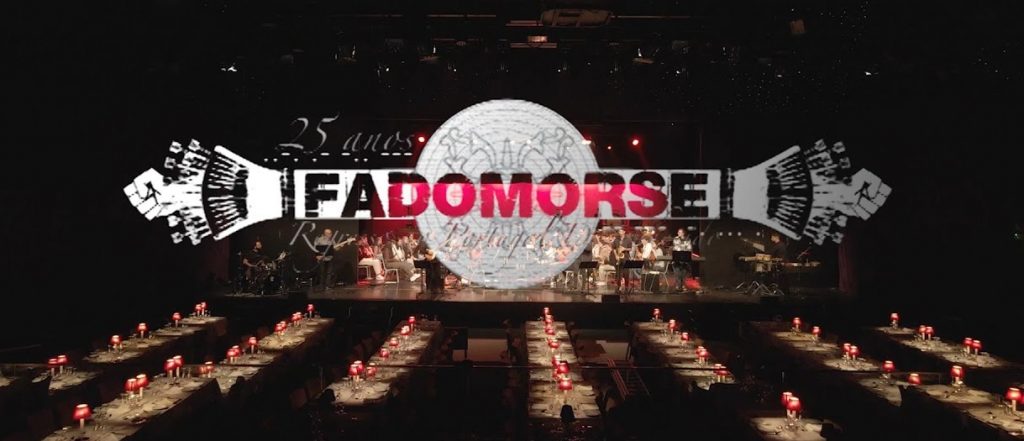It would not be very expected that one of the most interesting projects mixing the concepts of pop and traditional music would have taken place in Mirandela, but perhaps this is one of the great Portuguese prejudices, that of expecting that what is announced will always come from the big cities.
2000 was the year the group was born, but it was only two years later, in July, that we were treated to their first album, “Gritar o Fado”, an innovative work but still tied to some assumptions normally present at the beginning of their career. Supported by 30 cultural interventions for its dissemination, the album was presented as an author’s edition, embedded in a careful, discreet and functional package that included a Portuguese tile.
The sound content already indicated the premises of what would become the group’s career: collection and transformation of traditional songs, worked into pop song format, denoting the fact that the discography of Né Ladeiras and Banda do Casaco had been attentively listened to by those bands.
In November 2004, Fadomorse released “Entrudo”, a new album with another original cover – a replica of a secular mask, traditionally used in Carnival festivities in the deep Douro region -, whose themes were celebrated live during an extensive 47-year tour. dates held from the north to the south of the country and which drew attention to the band among many music lovers who were still unaware of it.
“Entrudo” was a breakthrough album in which Fadomorse, in constant internal evolution, sought to go a little further than what they had done on their debut. The group then performed as a result of the combined effort of a series of local musicians: Hugo Correia (Portuguese guitar, piano, voice), Hugo Ferraz (MC), Ronaldo Firmino (drums), Manuel Pinheiro (percussion), Bruno Rodrigues (bass), Jorge Loura (guitar), João Figueiredo (saxophone), Elisa Trigo (transverse flute, piccolo), David Leão (pastoral flute), and Tiago Canadas (sound design, bass drums).
Given the good reception obtained, Fadomorse then reissued, in May 2005, its first album, inviting renowned musicians such as Adolfo Luxúria Canibal (Mão Morta), Abel Beja (Primitive Reason), Alex FX, Diana Silveira, Fat Freddy or Fish (Pluto). In June of that year, they recorded a live DVD, with the musical “Matraquilho dos Pobres” and, on April 25, they released the EP “Popétnico”, which features Amélia Muge, Daniela Correia and Jackeline Fernandes.
The year 2006 is practically dedicated to live performances, through the successful “Íntimo Tour”, performing in 48 spaces located everywhere. They took the opportunity to record their best performances with a view to later editing a live album, which ended up not happening. In 2008, with Sofia Portugal (voice), Dasilvassauro (percudrum), Toninho Arreboutas (double bass, Bass), Konstantino Meio Litro (transverse flute, piccolo, ocarina and bagpipes), Dionisio Faisca (cavaquinho, braguesa, Portuguese guitar, voice), Francisco Balsas (keyboards, accordion), Amílcar Travolta (percussion, voice) and Queçi Manbo (guitar, voice), Fadomorse finally releases its final work, “Folklore Hardcore”, an album that, despite continuing to base its premises on matrix of traditional music, breaks with the barriers previously imposed, appealing more to electronics and the unbridled rhythm of rock.
From the apparent chaos installed, we can see that a complex album is born, somewhat confusing given the number of directions pointed out, but where the essence of the roots of Portuguese rural music is once again explored. About the album, the project’s mentor and multi-instrumentalist, Hugo Correia, will say that “this album is the most surreal of our lives. With a very pronounced rural charm, we adapted this concept from a radio station.
It is a very sarcastic and good-natured work that stands out from the others by presenting a global objective in its sound, which is to have tried to make a radio program within an album.” Fadomorse meanwhile entered a lethargic period that announced their end. However, in 2011, news emerged that the band is still active, preparing to celebrate its 13 years of existence and release a new album, “FMI – Fadomorse Magála Invisível” under its name, which bears its name. will be commercially published on February 29, 2012.
The album’s presentation tour will begin later this year, on November 26th, at Teatro São Luís in Lisbon as part of the Lisboa Mistura Festival. Long live the crisis! The group is currently made up of Hugo Correia, Hugo Ferraz, Ronaldo Firmino, Bruno Rodrigues, Henrique Portovedo, Maria da Rocha, Ludgero Rosas, Sofia Portugal and Tiago Fernandes.






Music is the companion of solitude
One good thing about music is that you feel no pain when it hits you.
Your writing is so well-researched and thorough. I’m impressed.
I watched the youtube video and it was very good
I watched the video and it was amazing